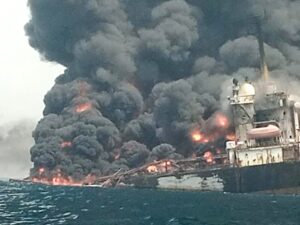The Nigerian Maritime Administration and Safety Agency (NIMASA) said it has sent a joint team of experts from relevant agencies to the site of the explosion of the Floating Production, Storage and Offloading (FPSO) vessel TRINITY SPIRIT.

Recall that the FPSO exploded last Wednesday and sank later owing to the impact.
But the Director-General of NIMASA, Dr. Bashir Jamoh said last weekend via his verified twitter handle that: “Following the unfortunate explosion of FPSO Trinity Spirit at the Ukpokiti, we have dispatched a Joint Investigation Team of relevant agencies (NIMASA, NOSDRA, NUPRC (formerly DPR) & the Environmental agencies of Ondo & Bayelsa States for a preliminary assessment”
Built in 1976, Trinity Spirit measured 1,105ft and had a capacity of 274,774dwt, with a capacity to process up to 22,000 barrels of oil per day, inject up to 40,000 barrels of water per day and store 2 million barrels of oil, exploded and sunk at the Ukpokiti Terminal, around Excravos, Warri South-west, Delta State, Nigeria.
According to the first information, 10 workers were onboard the facilities, of which seven are missing, and three casualties feared.
Independent sources however hinted said last weekend that the 10 crew members who were on board at the time of explosion early on Wednesday remained unaccounted for as at weekend
Sources also confirmed that the ill-fated facility had not been maintained for sometime and had technical issues.
Nnimmo Bassey, from Health of Mother Foundation, which tracks oil spills in Nigeria said the vessel, which has been in operation for more than 30 years, had outlived its lifespan of 20 years, should have been decommissioned and was not supposed to carry any crude.
Read Also: Boat Passengers Lament State Of Boats Plying Lagos Waters
According to Reuters, an industry source with knowledge of operations of the Trinity Spirit FPSO said until five years ago, other companies, including large oil traders stored their crude on the vessel, which had capacity to produce 22,000 barrels per day and could store 2 million barrels.
A trading source who used to occasionally store oil on the vessel but stopped because of “too many technical issues. Old and badly maintained.”
The industry source added that there could have been problems with the vessel’s boilers and that it kept no more than 20,000 barrels of crude.
“Most, if not all of the big trading companies stopped using it several years ago,” the source said.
Kindly like us on Facebook
















Discussion about this post